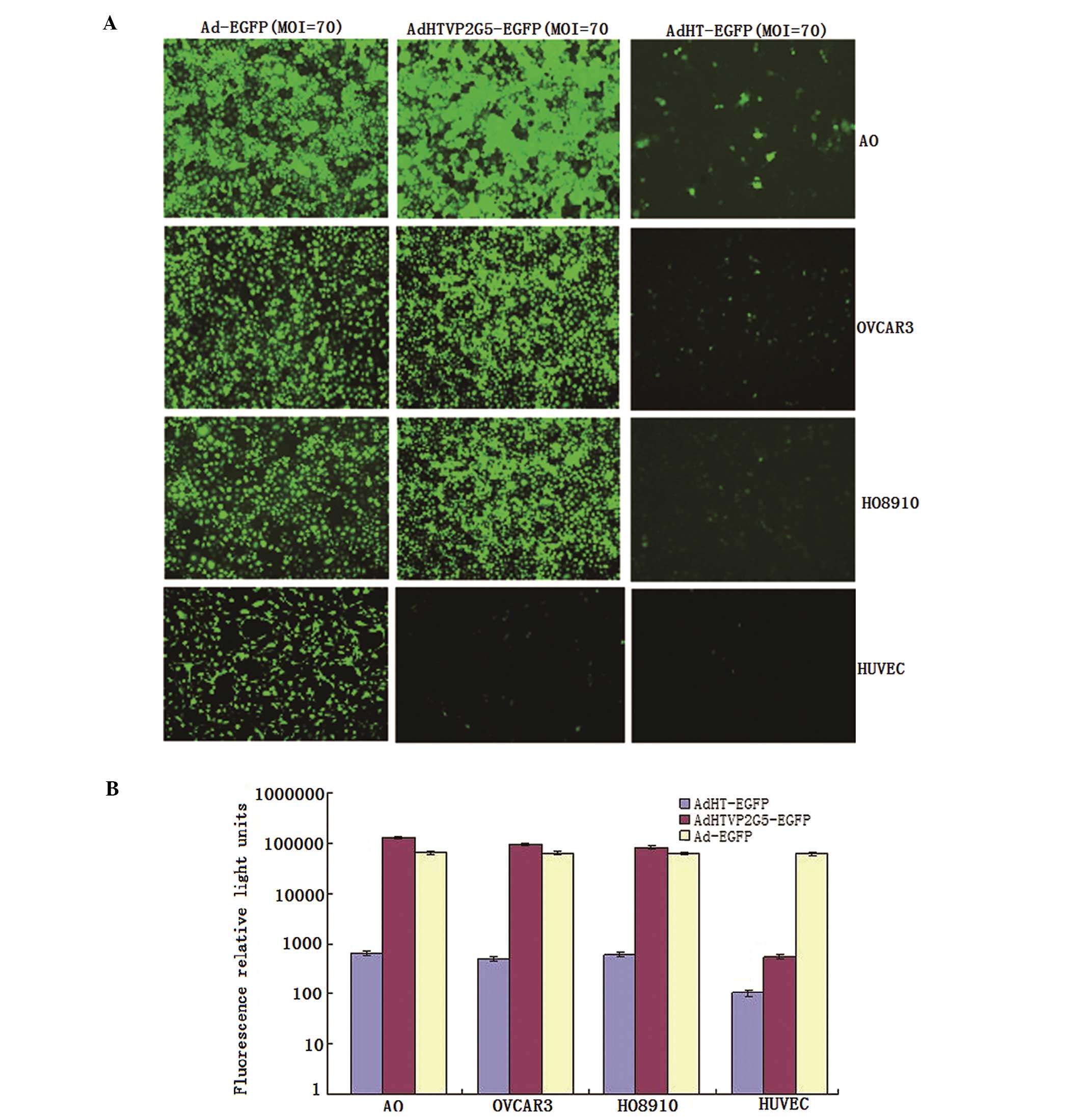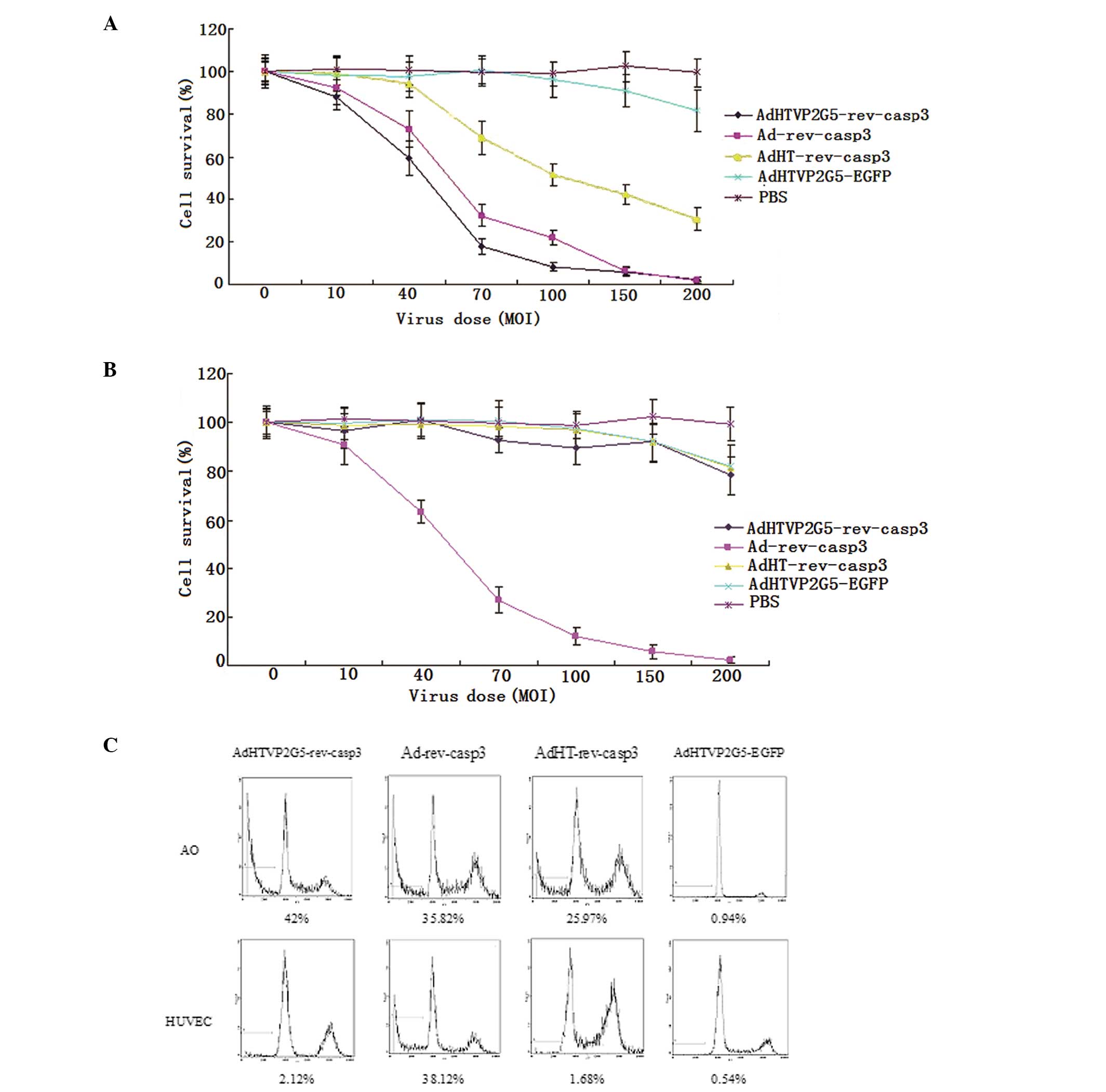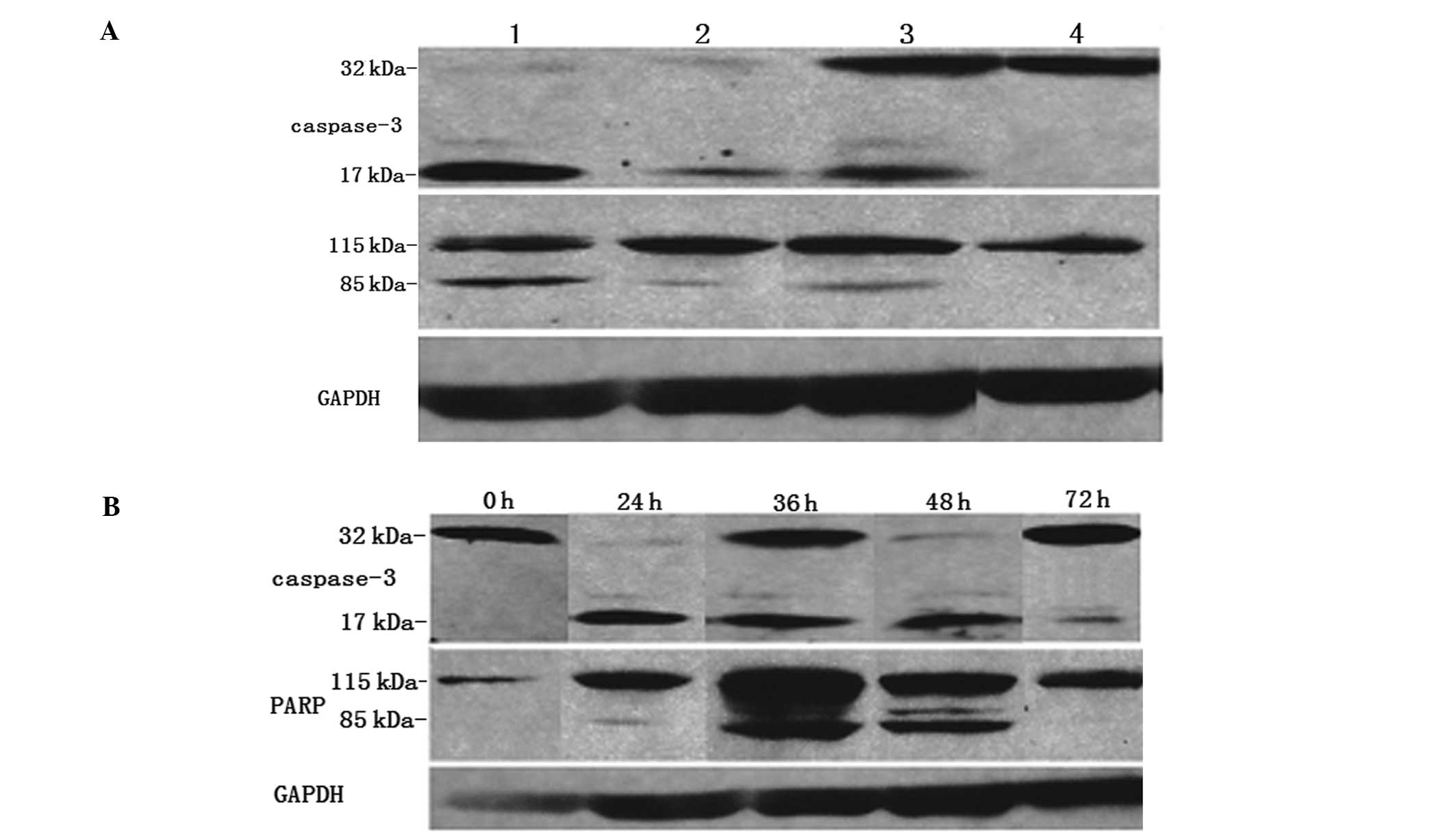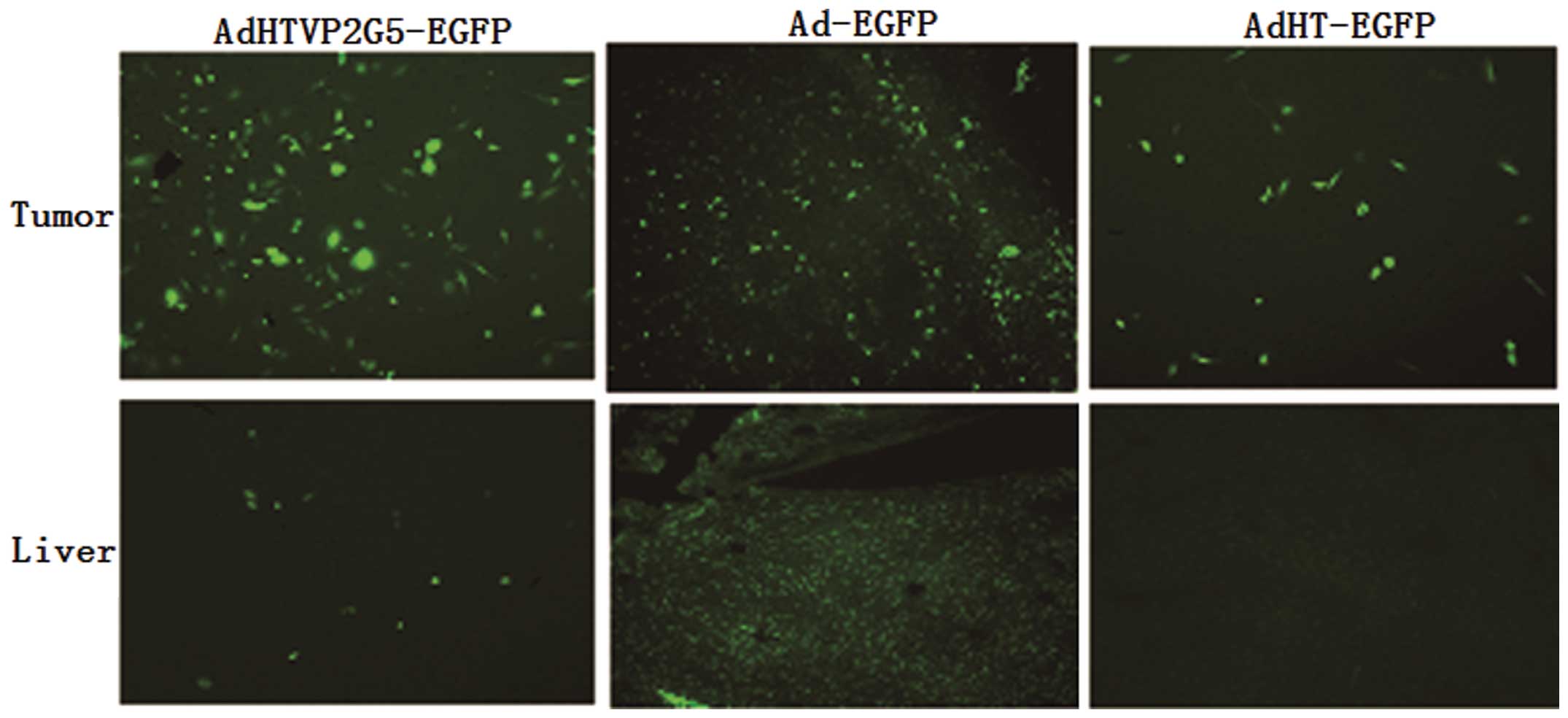|
1
|
Jia LT, Chen SY and Yang AG: Cancer gene
therapy targeting cellular apoptosis machinery. Cancer Treat Rev.
38:868–876. 2012. View Article : Google Scholar : PubMed/NCBI
|
|
2
|
Mazumder S, Plesca D and Almasan A:
Caspase-3 activation is a critical determinant of genotoxic
stress-induced apoptosis. Methods Mol Biol. 414:13–21.
2008.PubMed/NCBI
|
|
3
|
Srinivasula SM, Ahmad M, MacFarlane M, Luo
Z, Huang Z, Fernandes-Alnemri T and Alnemri ES: Generation of
constitutively active recombinant caspase-3 and -6 by rearrangement
of their subunits. J Bio Chem. 273:10107–10111. 1998. View Article : Google Scholar : PubMed/NCBI
|
|
4
|
Song Y and Shen K: Construction of
autocatalytic caspase-3 and its effects of inducing apoptosis in
human ovarian carcinoma. Zhonghua Fu Chan Ke Za Zhi. 42:846–851.
2007.(In Chinese).
|
|
5
|
Yang L, Cao Z, Yan H and Wood WC:
Coexistence of high levels of apoptotic signaling and inhibitor of
apoptotic proteins in human tumor cells: implication for cancer
specific therapy. Cancer Res. 63:6815–6824. 2003.PubMed/NCBI
|
|
6
|
Fujiwara T, Shirakawa Y and Kagawa S:
Telomerase-specific oncolytic virotherapy for human
gastrointestinal cancer. Expert Rev Anticancer Ther. 11:525–532.
2011. View Article : Google Scholar : PubMed/NCBI
|
|
7
|
Kyo S, Takakura M, Fujiwara T and Inoue M:
Understanding and exploiting hTERT promoter regulation for
diagnosis and treatment of human cancers. Cancer Sci. 99:1528–1538.
2008. View Article : Google Scholar : PubMed/NCBI
|
|
8
|
Kong BH, Song Y, Ma DX, Qu X and Jiang S:
In vitro treatment of ovarian cancer cells with cytosine
deaminase-thymidine kinase fusion disuicide gene therapy system
driven by human telomerase reverse transcriptase gene promoter.
Zhonghua Fu Chan Ke Za Zhi. 39:390–395. 2004.(In Chinese).
|
|
9
|
Song Y, Xia Z, Shen K and Zhai X:
Autocatalytic caspase-3 driven by human telomerase reverse
transcriptase promoter suppresses human ovarian carcinoma growth in
vitro and in mice. Int J Gynecol Cancer. 23:642–649. 2013.
View Article : Google Scholar
|
|
10
|
Kagawa S, Gu J, Swisher SG, Ji L, Roth JA,
Lai D, Stephens LC and Fang B: Antitumor effect of
adenovirus-mediated Bax gene transfer on p53-sensitive and
p53-resistant cancer lines. Cancer Res. 60:1157–1161.
2000.PubMed/NCBI
|
|
11
|
Li JT, Bian K, Zhang AL, Kim DH, Ashley
WW, Nath R, McCutcheon I, Fang B and Murad F: Targeting different
types of human meningioma and glioma cells using a novel adenoviral
vector expressing GFP-TRAIL fusion protein from hTERT promoter.
Cancer Cell Int. 11:352011. View Article : Google Scholar
|
|
12
|
Hwang do W, Kang JH, Jeong JM, Chung JK,
Lee MC, Kim S and Lee DS: Noninvasive in vivo monitoring of
neuronal differentiation using reporter driven by a neuronal
promoter. Eur J Nucl Med Mol Imaging. 35:135–145. 2008.PubMed/NCBI
|
|
13
|
Watanabe M, Ueki H, Ochiai K, Huang P,
Kobayashi Y, Nasu Y, Sasaki K, Kaku H, Kashiwakura Y and Kumon H:
Advanced two-step transcriptional amplification as a novel method
for cancer-specific gene expression and imaging. Oncol Rep.
26:769–775. 2011.PubMed/NCBI
|
|
14
|
Chen IY, Gheysens O, Li Z, Rasooly JA,
Wang Q, Paulmurugan R, Rosenberg J, Rodriguez-Porcel M, Willmann
JK, Wang DS, Contag CH, Robbins RC, Wu JC and Gambhir SS:
Noninvasive imaging of hypoxia-inducible factor-1α gene therapy for
myocardial ischemia. Hum Gene Ther Methods. 24:279–288. 2013.
|
|
15
|
Wu L, Johnson M and Sato M:
Transcriptionally-targeted gene therapy to detect and treat cancer.
Trends Mol Med. 9:421–429. 2003. View Article : Google Scholar : PubMed/NCBI
|
|
16
|
Adams JY, Johnson M, Sato M, Berger F,
Gambhir SS, Carey M, Iruela-Arispe ML and Wu L: Visualization of
advanced human prostate cancer lesions in living mice by a targeted
gene transfer vector and optical imaging. Nat Med. 8:891–897.
2002.PubMed/NCBI
|
|
17
|
Alemany R and Curiel DT: CAR-binding
ablation does not change biodistribution and toxicity of adenoviral
vectors. Gene Ther. 8:1347–1353. 2001. View Article : Google Scholar : PubMed/NCBI
|
|
18
|
Tao N, Gao GP, Parr M, Johnston J, Baradet
T, Wilson JM, Barsoum J and Fawell SE: Sequestration of adenoviral
vector by Kuffer cells leads to a nonlinear dose response of
transduction in liver. Mol Ther. 3:28–35. 2001. View Article : Google Scholar : PubMed/NCBI
|
|
19
|
Morral N, O’Neal WK, Rice K, Leland MM,
Piedra PA, Aguilar-Córdova E, Carey KD, Beaudet AL and Langston C:
Lethal toxicity, severe endothelial injury, and a threshold effect
with high doses of an adenoviral vector in baboons. Hum Gene Ther.
13:143–154. 2002. View Article : Google Scholar : PubMed/NCBI
|
|
20
|
Zhang Y, Chirmule N, Gao GP, Qian R,
Croyle M, Joshi B, Tazelaar J and Wilson JM: Acute cytokine
response to systemic adenoviral vectors in mice is mediated by
dendric cells and macrophages. Mol Ther. 3:697–707. 2001.
View Article : Google Scholar : PubMed/NCBI
|
|
21
|
Yang Y, Su Q and Wilson JM: Role of viral
antigens in destructive cellular immune responses to adenovirus
vector-transduced cells in mouse lungs. J Virol. 70:7209–7212.
1996.PubMed/NCBI
|
|
22
|
Jooss K, Yang Y, Fisher KJ and Wilson JM:
Transduction of dendritic cells by DNA viral vectors directs the
immune response to transgene products in muscle fibers. J Virol.
72:4212–4223. 1998.PubMed/NCBI
|
|
23
|
Brand K, Löser P, Arnold W, Bartels T and
Strauss M: Tumor cell-specific transgene expression prevents liver
toxicity of the adeno-HSV-tk/GCV approach. Gene Ther. 5:1363–1371.
1998. View Article : Google Scholar : PubMed/NCBI
|
|
24
|
Pastore L, Morral N, Zhou H, Garcia R,
Parks RJ, Kochanek S, Graham FL, Lee B and Beaudet AL: Use of a
liver-specific promoter reduces immune response to the transgene in
adenoviral vectors. Hum Gene Ther. 10:1773–1781. 1999. View Article : Google Scholar : PubMed/NCBI
|




















